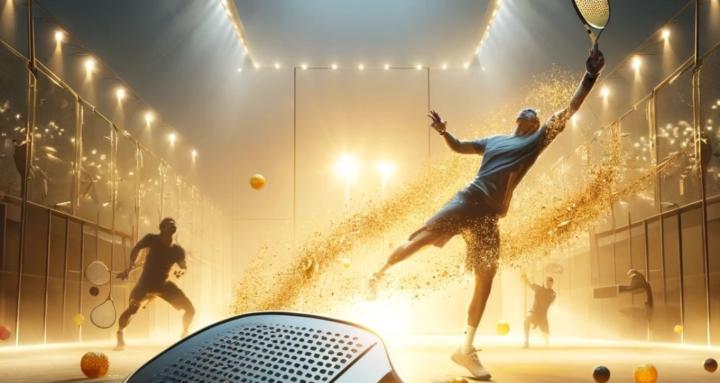
Write something
Is This the Golden Ticket for Female Athletes? 💰🎾
Hell all Pickleballers! 👋 Let's talk pickleball. You might think of it as a fun, social game for all ages, and you'd be right! But it's also rapidly becoming a serious opportunity, especially for female athletes looking to make a name (and a living!) in the world of sports. Is pickleball the most lucrative sport for female athletes right now? Let's dive in! For years, the landscape of professional sports has been uneven. While male athletes in many sports enjoy massive contracts and endorsement deals, female athletes often face a significant pay gap and fewer opportunities. 😔 But pickleball is shaking things up! Why Pickleball is Different: - Level Playing Field (Literally!): Pickleball's relatively young professional scene means there's less established hierarchy. The playing field is more level, giving female athletes a chance to rise to the top quickly. 🚀 - Explosive Growth: Pickleball is the fastest-growing sport in America! 📈 This translates to increased media attention, sponsorships, and prize money. More eyes on the sport mean more opportunities for athletes to shine and attract lucrative deals. - Accessibility: Unlike sports that require years of specialized training from a young age, pickleball is relatively easy to pick up. This allows athletes from other sports – tennis, badminton, even volleyball – to transition and find success. 🤸♀️ - Strong Community: The pickleball community is known for being inclusive and supportive. This creates a positive environment for female athletes to thrive and build their brand. 🤗 - Endorsement Opportunities: As the sport grows, so do the endorsement opportunities. Companies are eager to partner with rising stars in pickleball, and female athletes are increasingly becoming the face of the sport. 🌟 The Money Talk: While pickleball prize money might not yet rival that of, say, professional tennis at the very top, the earning potential is rapidly increasing. Top female pickleball players are already earning significant income through tournament winnings, sponsorships, clinics, and merchandise sales. 🤑
1
0

OUR VISION 🚀
[IMPORTANT READ] Wow! I want to take a moment to thank each and every one of you who has already joined this Pickleball Connection of a group! 🙌 Together, the goal is simple… Bring in over 100+ passionate pickleball players into this thriving community, and make the virtual court buzz with energy! Everyone should have the same mindset that this is a group where we grow our game, level up our skills, and build lasting connections through our shared love of pickleball. 🏓💥 Think of Skool as your go-to clubhouse — a central hub where your community helps you sharpen your serve, dial in your dinks, and dominate the kitchen… all while having a blast. What you'll gain in this group: ✅ Pro tips to boost your skills — fast ✅ Gear reviews, paddle debates, and product insights ✅ Strategies to improve your doubles game ✅ Meetups, tournaments, and league networking ✅ A supportive tribe of players at every level Together, we’re building a championship-level tribe of pickleball lovers — from beginners to seasoned pros — who want to train, compete, and grow on and off the court. 🎯Here’s our first mission as a group: 🔥 Master the Fundamentals & Level Up Fast 💥 Build Local + Virtual Connections Through Pickleball 🚀 Help Each Other Play Smarter, Stronger & Longer 💡 Discover New Ways to Get Involved & Improve FEW THINGS TO NOTE: 1️⃣ This group is for ALL skill levels — brand new to elite! 2️⃣ Check the Calendar Tab up top for our next LIVE Training or Open Match Meetup. 3️⃣ Say hey below and introduce yourself! Let us know how long you’ve been playing and what city you’re reppin’! 🏙️ Let’s make this group fun, active, and full of good vibes and sharp serves! 💯🎉 – Alphonso
Join The Contest Now!!! - Comment JOIN CONTEST BELOW...
🎉🥒 Pickleball Connection Contest Alert! 🏓🎉 Welcome to the hottest new community for pickleball enthusiasts—Pickleball Connection! To celebrate, we're thrilled to announce an exciting contest where you can win big! 🎊 🏆 Prizes up for Grabs: - 1 Grand Prize: $150 Gift Card to Pickleball Central! 💵✨ - 2 Runner-up Prizes: $50 Gift Cards! 🎁🎉 How to Enter: You have already joined our amazing Skool community now just follow the steps below to complete entry: 1. Comment to Enter: Head over to the contest post in our community and drop a comment saying “JOIN Contest”! 🗨️💬 2. Join The Live Drawing: Once we hit 250 participants, I'll host a live draw the very next day! 🎥👀 Make sure you tune in for the chance to be one of our lucky winners! Don’t miss out on this opportunity to be part of an amazing pickleball community and score some fantastic prizes! Enter now and let’s get this ball rolling! 🚀🥳 Good luck to all participants, and see you on the court! 🌟🏓
0
0
Why Pickleball is the Fastest Growing Sport in the U.S. in 2024 🏓✨
As we step into 2024, it's no surprise that pickleball has been declared the fastest growing sport in the United States! With an influx of new players hitting the courts and communities embracing this exciting game, pickleball is becoming more than just a passing trend—it’s a cultural phenomenon. But what exactly is fueling this explosive growth? 🤔 Accessibility and Inclusivity One of the most appealing aspects of pickleball is its accessibility. Designed for players of all ages and skill levels, pickleball can be enjoyed by kids, adults, and seniors alike 🧒👵. The smaller court and the use of a lightweight paddle and plastic ball make it easy to learn and play without the intimidation factor often associated with tennis. This inclusivity has attracted a diverse group of players, from families looking for quality time together to competitive athletes seeking a new challenge! 🎉 Community Spirit 🤝 Pickleball is more than just a sport; it's a community! Local clubs and public pickleball courts are popping up across the country, fostering camaraderie and connection among players ❤️. Whether it’s casual matches or organized tournaments, the sense of community is palpable. Many players form friendships that extend beyond the court, creating social networks that enhance their overall experience. This engagement is essential for keeping players coming back and encouraging newcomers to join! 🙌 Health Benefits 💪 In today’s health-conscious society, many people are looking for fun ways to stay active. Pickleball provides an excellent workout, combining elements of cardiovascular fitness, agility, and hand-eye coordination 🏃♂️🎯. The sport is low-impact, making it safer for those with joint concerns, while still delivering a rigorous game that gets the heart pumping! ❤️🔥 As awareness continues to grow about the physical and mental health benefits of pickleball, more people are eager to pick up a paddle and join the fun! Evolving Competitive Scene 🏆 The competitive aspect of pickleball has also contributed to its rapid growth. With more regional and national tournaments being organized, players of all skill levels can showcase their abilities and compete for titles. Professionals have emerged from the sport, inspiring many to pursue their own ambitions in pickleball. Increased media coverage of tournaments and the rise of professional leagues have brought more attention to the sport, encouraging even more participants to get involved! 🎊
0
0

🏓 What Is Pickleball? A Beginner’s Guide to the Game That’s Taking Over
If you're new to pickleball or just curious about where this wildly popular sport came from, you're in the right place. Pickleball has quickly become the fastest-growing sport in the United States — and for good reason. It’s simple to learn, easy on the joints, and incredibly fun to play. Let’s break down the basics — including how it started, how it’s played, and why it's become a favorite for players of all ages. 🏁 A Quick Look Back: The Origins of Pickleball Believe it or not, pickleball dates back to 1965, when it was created by three dads — Joel Pritchard, Bill Bell, and Barney McCallum — in Washington state. The goal? To entertain their bored kids. Using elements of badminton, tennis, and table tennis, they created a new game using ping-pong paddles and a plastic ball. The name “pickleball”? It’s said to have come from the Pritchards’ dog, Pickles, who loved chasing stray balls. (Though some say it refers to a "pickle boat," a term from rowing.) Either way, the name stuck — and so did the game. 🎾 How the Game Works Pickleball is played on a small court, about one-third the size of a tennis court, and can be played in singles or doubles format. Players use solid paddles to hit a perforated plastic ball (similar to a wiffle ball) over a net. The game is typically played to 11 points, and you must win by at least 2. There are specific rules for serving, volleying, and staying out of the “kitchen” — the no-volley zone near the net — which adds unique strategy and excitement to the game. 🧠 Simple to Learn, Tough to Master One of the biggest reasons pickleball has gained popularity is that anyone can pick it up quickly. Unlike tennis, it doesn’t require intense training to start having fun. The paddles are lighter, the ball is slower, and the court is smaller — all of which make it ideal for beginners, seniors, or anyone looking for a social, low-impact workout. But don’t let the simplicity fool you. As you advance, you’ll discover a world of strategy, technique, and competition that keeps seasoned players hooked for years.
0
0

1-8 of 8

skool.com/test-name-8640
Unlock elite pickleball secrets, boost your game instantly, and join an exclusive, proven community of players mastering the court together.
Powered by
